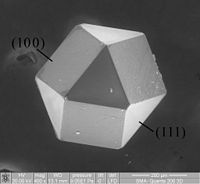
Photo from wikipedia
Aberration-corrected scanning transmission electron microscopy (AC-STEM) has evolved into the most powerful characterization and manufacturing platform for all materials, especially functional materials with complex structural characteristics that respond dynamically to… Click to show full abstract
Aberration-corrected scanning transmission electron microscopy (AC-STEM) has evolved into the most powerful characterization and manufacturing platform for all materials, especially functional materials with complex structural characteristics that respond dynamically to external fields. It has become possible to directly observe and tune all kinds of defects, including those at the crucial atomic scale. In-depth understanding and technically tailoring structural defects will be of great significance for revealing the structure-performance relation of existing high-property materials, as well as for foreseeing paths to the design of high-performance materials. Insights would be gained from piezoelectrics and thermoelectrics, two representative functional materials. A general strategy is highlighted for optimizing these functional materials’ properties, namely defect engineering at the atomic scale.
Journal Title: Materials
Year Published: 2022
Link to full text (if available)
Share on Social Media: Sign Up to like & get
recommendations!